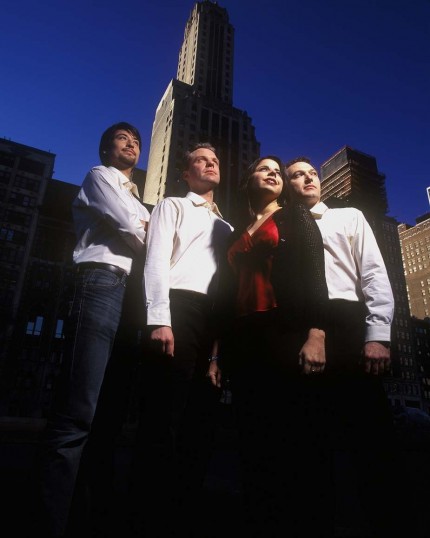Pacifica Quartet’s artistry shines brightly in UC’s Logan Center

At any given performance, the Pacifica Quartet, whose recordings range from the complete string quartets of Elliott Carter to those of Mendelssohn, sounds like a million dollars. Sunday afternoon, in the intimate performance hall of the University of Chicago’s new Logan Center for the Arts, they sounded like something much higher than that relatively low set of seven figures.
The ensemble’s program of quartets by Boccherini, Bartok and Beethoven was their first public concert in the center, the U of C’s new $114 million, 11-story arts center at 60th Street on the west end of the campus’ Midway Plaisance. With 474 seats, the sleek, wood-lined space with acoustic design by Chicago’s Kirkegaard Associates, is ideal for chamber music. In Sunday’s concert, part of the University of Chicago Presents series, the Pacifica members plumbed every corner of the hall’s warm yet crystal-clear acoustical space.
Boccherini’s String Quartet in E-flat, Op. 58, No. 2, composed in 1799, was something of a warmup for the ensemble. It had some compelling moments, especially in the third movement, Larghetto. First violinist Simin Ganatra floated a soulful, searching melody while her colleagues—second violinist Sibbi Bernhardsson, violist Masumi Per Rostad and cellist Brandon Vamos—offered their support with a somber, slow-moving accompaniment.
But the main events were clearly Bartok’s String Quartet No. 6 in D Major and the Beethoven A minor Quartet, Op. 132, which closed the program. The hall’s acoustics functioned like an aural microscope; we heard every detail of bow touching string, the breathy edges, the clarion heart of a singing tone. Such close scrutiny only confirmed Pacifica’s mastery of impeccable intonation, crisp phrasing and unified attack.
But the real achievement was the ardent passion that those technically gifted players brought to Bartok’s haunted, restless Sixth String Quartet and Beethoven’s alternately high-spirited and profoundly introspective Op. 132. A sense of vast loneliness suffused Rostad’s viola solo that opened the Bartok quartet. Throughout the work, the quartet’s sharp, unison strokes had the stern force of a Bach fugue. As they picked up each other’s phrases, however, jumping in to echo a singing melody or an austere rhythmic pattern, the players seemed to be reading each other’s minds.
The afternoon’s high point was the third movement of the Beethoven quartet, a heartfelt song of thanksgiving for Beethoven’s recovery from a serious illness. The performance had an endearingly human quality, the movement’s solemn, hymn-like chorale conveying a sense of earnest, humble thanks for deliverance. But there were moments of almost giddy, child-like relief. Periodically Ganatra’s violin danced in delighted flights and a pulsing viola and cello urged her on. The contrast between sunny, light-hearted hope and deeply felt gratitude offered a glimpse of everyday life. Beethoven may be a musical titan, but the Pacifica’s performance reminded us that he is, above all, human.
Posted in Performances

